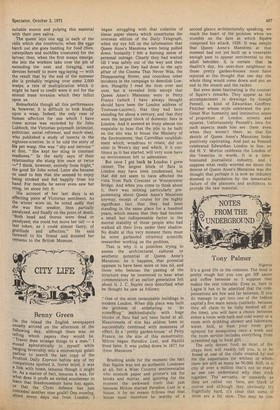Tony Palmer
Nigeria It's a good life in the colonies. The food is pretty rough but you can get HP sauce and coffee bernoise so I suppose that makes the rest tolerable. Even so, here in Lagos it has to be admitted that the com pensations are few and far between. If you do manage to get into one of the federal capital's five main hotels (unlikely, because they all claim to be fully booked all of the time), you will have a choice between either a room with bath and cold water or a room with dribbling shower and lukewarm water. Still, at least your room gets sprayed for mosquitoes once a week and the room service includes everything from scrambled egg to local girl.
The only decent food, as most of the chaps here will readily tell you, is to be found at one of the clubs created by and
for the expatriates (or whites) of whom there are still as many as 50,000. Still, in a city of over a million that's not so many so one can understand why they stick together. The servants, or stewards as they are called out here, are black of course and although they obviously try frightfully hard, it's clear that some of them are a bit slow. This may be con
nected with the Nigerian's endearing habit of always being at least an hour late for everything. Or it may be that they simply have an innate reluctance to be organized or to organize. For example, they always manage to lay out the Sheffield stainless steel cutlery correctly at table and do a very nice line in French dry wines and German hock; but they don't seem to have grasped that egg and chips (a favourite Nigerian dish) is better served hot, or at least warm. Incidentally, most of the chaps down at the Ikoyi Club think that the thirty-month civil war was actually prolonged by Nigerian business interests as long as was possible since the whole thing was so profitable; and Gowon didn't want his war cut short while the pickings were good.
The pickings are also pretty good for any British firm of architects or consultant engineers who have since moved in to ' help ' their black brothers. Of course, it has to be admitted that most of the black brothers are simply not capable of helping themselves — even when you pay them as much as £20 a month. In spite of all those years of colonial rule, most of the main roads, for example, are still pot-holed and swampy. And Nigerian TV in Lagos, the pride of the nation, consists of one and a half studios, four clapped-out cameras, two antique video machines and two telecine machines that pre-date the South Kensington Science Museum. Still, the local department stores have a plentiful supply of Bibles and western pop music and something called Tampax seems to be very big over here. Most of the air conditioning is secondhand and American, as are the plentiful supply of girlie magazines which are obviously sold over and over again to the unsuspecting and/or randy traveller. Up at the club, however, such things are just giggled about over sherry or in between a game of squash and a good rub down by a steward. After all, as long as the Union Jack still flies • (which it does) and our noble Queen sits four-square and untarnished outside the Parliament building (which she does), and as long as there are quarter sessions and assize courts and magistrates' courst (which there are), the British conscience can rest easy.
One thing which doesn't quite fit with my preconceptions is Mr Wilson. Yes, our Harold. You see, it may surprise you to know that he is one of the national heroes, a position which he has occupied ever since his visit to Nigeria during the Civil War. The fact that he did not succumb to all that propaganda from Biafra about the starving millions has endeared him for ever to the Government. By comparison, Ted is considered a joke who is always in the yacht club like the rest of the expatriates. Well, that I think is a sufficient comment in itself about the way natives think, a view which can only be reinforced when I tell you that Oxfam and all the other charitable organisations which sent aid during the Civil War are now looked upon by the Nigerians as naive and interfering do-gooders. For example, the Nigerians claim that many of the photographs which littered Western newspapers of pot-bellied children in need of a good meal, were actually taken before the war as part of a nation-wide, Nigerian organised campaign against malnutrition.
They tell me there's still a lot of censorship in Nigeria about what you can film and what you can write about; the Nigerians do seem to be very touchy about the impressions they give abroad. So you will understand that I'm having to be a bit careful about one or two things, particularly about the army which seems to be everywhere — although I must say they do seem to be very polite. Still, if you're looking for a land of opportunity, where labour is dirt cheap and servants are plentiful, you could do worse than come here.

































 Previous page
Previous page